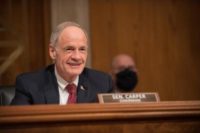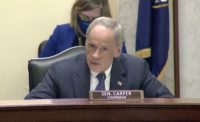Preliminary discussions leading up to infrastructure legislation—for surface transportation or something broader—are moving ahead on Capitol Hill.
One key Senate lawmaker, Environment and Public Works Committee Chairman Tom Carper (D-Del.), says his goal is to have his panel approve a new highway authorization measure by Memorial Day. He also wants the bill to emphasize provisions to address climate change and promote infrastructure resilience.
In the House, Transportation and Infrastructure Committee Chairman Peter DeFazio (D-Ore.) also is working on an infrastructure package. "We're going to do real infrastructure investment," DeFazio says. "But it is also going to be transformative."
At the Senate EPW committee’s first hearing in the new Congress on infrastructure legislation, held Feb. 24, Carper also said the panel already has “a road map” for the envisioned new highway bill — the America's Transportation Infrastructure Act, a $287-billion, five-year bill the committee cleared unanimously in July 2019 but went no further.
[View Senate committee hearing webcast here.]
Climate Change Provisions
Carper says he wants to "build on" the 2019 bill, adding more provisions dealing with climate change, including ways to reduce the highway transportation sector’s carbon emissions and to make highways and bridges more resilient in the face of floods and other natural disasters.
Later in the day, in a virtual appearance before the American Association of State Highway and Transportation Officials (AASHTO) annual winter meeting, Carper noted the 2019 EPW bill had a resilience section and $10 billion in authorizations, which he'd like to expand upon.
DeFazio also told the AASHTO gathering his legislation will address how to build infrastructure to withstand severe weather occurrences, including wildfires, flooding and rising sea levels.
"Climate change is real," DeFazio said. "And the most significant emitter of carbon in the United States is the transportation sector."
The big hurdle, nearly all observers agree, is finding a way to pay for the bill.
“Much of our transportation infrastructure is in sorry shape,” Carper said at the committee hearing. “Unfortunately, a lot of it is getting worse, not better.” A solution will require federal, state and local agencies to pitch in, he said, adding: “This is an all-hands-on-deck moment."
Vehicle-miles fee
EPW's 2019 bill included a national pilot program for a vehicle miles traveled (VMT) fee or charge. VMTs have been viewed for years as a promising way to fund highways—eventually. “It was a good. Idea then,” Carper said. “And It’s an even better idea now.” DeFazio also favors a VMT national pilot plan.
The House committee's top Republican, Sam Graves (Mo.), is bullish about converting to a VMT approach. "It could be done right now, with the technology that we have," Graves told AASHTO attendees.
But Carper said VMTs are not likely to be a near-term solution. Carper said what is necessary is a “bridge” mechanism “or really several bridges” to get from the current motor-fuel-tax-based approach to a new one that would rely on VMTs.
But finding that revenue is not EPW's responsibility. “For that, we’re going to be looking to the Finance Committee for help,” Carper said.
EPW’s new ranking Republican, Sen. Shelley Moore Capito (W.Va.), added that “certainty of funding, consistency of regulations and flexibility in tailoring investments to suit the diverse needs of state, rural and urban communities is essential.”
Victoria Sheehan, New Hampshire Transportation Commissioner—who also was testifying to the committee on behalf of AASHTO—reiterated that organization's recommendation that Congress should continue to follow the current system of distributing most of the overall federal funding to states via formulas. The group also is seeking increased funding overall.




Post a comment to this article
Report Abusive Comment